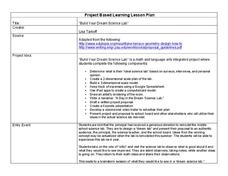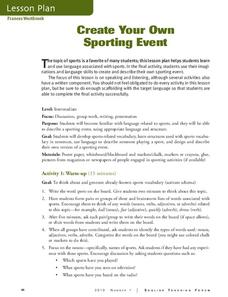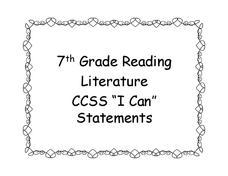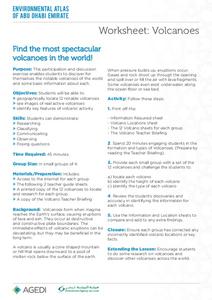Library of Congress
Thomas Jefferson's Library: Making the Case for a National Library
The United States Library of Congress, the largest library in the world. But such was not always the case. The library was destroyed during the War of 1812. In a persuasive letter to Samuel H. Smith, Thomas Jefferson offered to sell his...
J. Paul Getty Trust
Looking and Learning in the Art Museum — Lesson 3
Curator, artist, art handler, archivist, conservator-restorer, guide. Who would have thought there were so many different kinds of museum professionals? After a visit to an art museum, class members reflect on the role of the museum in...
J. Paul Getty Trust
Picturing a Story: Photo Essay about a Community, Event or Issue
Picture this. Class members follow in the footsteps of W. Eugene Smith, Dorothea Lange, James Nachtwey, and Lewis Hine by creating their own photo essay about a local event or issue.
Discovery Education
Is Our Community Influenced by the Opioid Epidemic?
Opioid abuse is becoming a national crisis, but combating the influence of opioids requires examining the ways it affects individual communities. A thorough teacher guide provides step-by-step instructions about implementing an...
Fluence Learning
Writing Informative Text: Did Shakespeare Write Shakespeare?
William Shakespeare penned some of the richest and most fascinating works of literature—or did he? Middle schoolers read three brief informative passages and conduct additional research to evaluate the claim that Shakespeare did not...
Fluence Learning
Writing an Argument: Is Electronic Communication Helpful or Harmful?
Technology has undoubtedly improved the lives of people around the world—but has it improved communication? Seventh graders read two informative passages about the rise of texting and emailing versus in-person conversations before...
Big Kid Science
Eclipse Classroom Activities: Cultural Significance Project
What better way to celebrate eclipses than across cultures? Explore myths of solar and lunar eclipses from ancient cultures like the Chinese, Ancient Greek, Mesoamerican, Incan, Egyptian, Ancient Babylonian, and Middle Eastern. Learners...
Federal Reserve Bank
Lesson 3: A Fresh Start
The members of your economics class may be busy earning graduation credits, but the credit they should be concerned about is their financial credit. The third instructional activity in a unit about Hurricane Katrina and other events that...
Federal Reserve Bank
Lesson 2: In the Aftermath
Don't wait for a crisis to get your finances together. An economics lesson demonstrates the importance of understanding crucial documents, banking basics, and financial tools with the focus on Hurricane Katrina in 2005 and its effects.
Federal Reserve Bank
Lesson 1: Katrina Strikes
Most families have an emergency kit in their home with flashlights, water, and extra food. But what happens to your money when disaster strikes? An economics lesson focused on the aftermath of Hurricane Katrina in 2005 demonstrates the...
Curated OER
Build Your Dream Science Lab
Would your ideal science lab be filled with bubbling beakers and zapping Tesla coils? Or would it contain state-of-the-art computer technology and data analysis? Dream big with an innovative lesson that connects math and language arts...
ReadWriteThink
Beyond the Story: A Dickens of a Party
It's time to party like it's 1899! Incorporate a research-based celebration of the Victorian Era into your unit on A Christmas Carol by Charles Dickens. After learners read the novella or view a production of the play, they craft a...
US National Library of Medicine
Science and Society: Preventing the Spread of Disease
Looking for a valuable resource on the spread of infectious diseases? Here is a instructional activity in which pupils simulate the spread of diseases and learn about how to prevent them from spreading. Class members read case studies...
Wish for the Future
Wish for the Future
What would be your class's ideal world 30 years in the future? What about 100 years? Use a series of activities to discuss globalization, sustainability, scientific contributions to society, and the global community of which your...
New York City Department of Education
Geography and Early Peoples of the Western Hemisphere
Young historians discover the early people of the western hemisphere. The unit explores how the land changed, how it was used and homes of early Americans such as Incas, Mayans, Inuits, Aztecs, and Pueblos. Individuals also examine these...
American English
Create Your Own Sporting Event
Combine vocabulary development and a study of verb tenses with a general introduction to sports. Class members get acquainted with the language associated with sports, and then complete a project to design and describe their own version...
Avi Writer
Sophia’s War: A Tale of the Revolution Teaching Guide
Sophia's War, Avi's novel that tracks the adventures of Sophia Calderwood, a fictional character, as well as the true stories of British Major John Andre and General Benedict Arnold during the American Revolution, is the anchor text of...
Curated OER
Phineas Gage: “Medicine: Then and Now” Pre-Reading Activity
What did medicine look like a hundred years ago? Two hundred years ago? Invite small groups to conduct research on the history of a chosen medical advancement before reading Phineas Gage: A Gruesome but True Story About Brain Science....
Curriculum Corner
7th Grade ELA "I Can" Statement Posters
Help your seventh graders relate the ELA Common Core standards to their own learning with these "I Can" statement posters. Each standard has been translated into a statement that pupils can understand and placed on its own page for easy...
Curriculum Corner
7th Grade ELA Common Core Checklists
Track your class's progress on all of the ELA Common Core standards with these handy charts. Along the left side, each seventh grade identifier is listed along with the full text of the standard. As you teach, reteach, assess, and...
Pearson
Performance-Based Assessment Practice Test (Grade 7 ELA/Literacy)
Give your class a taste of the Common Core with a practice test that includes both literary and informational reading passages. Pupils respond to related multiple choice questions and longer written response questions. See the materials...
Houston Independent School District
Creating a Successful Project
Guide your learners step by step through the process of designing an original, independent student project. This resource includes a wealth of worksheets and materials, including student project checklists, timelines, primary and...
Environment Agency - Abu Dhabi
Find the Most Spectacular Volcanoes in the World!
Heat things up in your earth science class with this collaborative lesson on volcanoes. After first being introduced to the different types of volcanoes and how they are formed, young geologists work in small groups to research the...
NOAA
Seafood and Human Health
Whether your young biologists realize it or not, humans play a significant role in marine ecosystems. To help them understand this fact children first create graphical representations that show homo sapiens' place in marine food chains,...

























